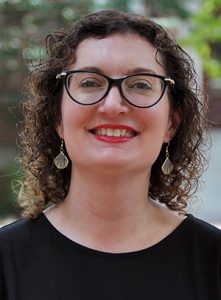Student Pawelski Wins Award for Paper Examining Documentation of Cultural History as a Human Rights Issue
August 23, 2017
School of Information and Library Science
Before Nicole Pawelski began contemplating a professional career in archives, she made a very personal connection with an online archive affiliated with the Near East Relief Society (NER), which helped rescue children, including Pawelski’s paternal grandfather, during the Armenian Genocide of 1915.
“I have a photograph of him with a group of other boys, and a sign in the background that reads ‘Near East Relief Working Boys’ Home, Cairo,’” said Pawelski. “I knew that my grandfather traveled from Aleppo, Syria to Cairo, Egypt, but I didn’t know any details, and I thought that the NER might be able to answer my questions.”
When Pawelski took INLS 556: Introduction to Archives at the University of North Carolina at Chapel Hill School of Information and Library Science (SILS) last fall, she used her family’s past and her experience with the NER archive as a launching point for her research. The resulting paper has earned her the 2017 Gene J. Williams Award from the Society of North Carolina Archivists (SNCA).
The notification from the award’s committee said Pawelski’s paper was “unanimously selected,” and that the committee found the use of her family’s story as a frame for the consideration of the documentation of marginalized groups’ cultural history as a human rights issue “extremely compelling.” The award includes a $100 prize, a one-year membership in the SNCA, and publication in the Journal of the Society of North Carolina Archivists (J-SNCA). Pawelski’s win continues SILS’ strong representation in this contest, with the current streak of winners extending back to 2010.
Pawelski is pursuing her Master of Science in Library Science (MSLS) at SILS as a part-time student, juggling her coursework with the care of her two children. She said her interest in archives started with her first job out of college. She worked for a company that published educational books for children and was tasked with finding photos to illustrate the texts. “For our biographies and history books, we worked with archives and special collections at universities and historical societies, and I was fascinated by the old photographs,” she said.

Pawelski discovered the NER archive in 2015, the 100th anniversary of the genocide. Although the archive didn’t have any personal information on her grandfather, they were able to provide details about how he likely ended up in Cairo for the photo. When children in the orphanages grew older, they were transferred to such homes where they could be apprenticed to other Armenians. Her grandfather was apprenticed to a tailor in Cairo who paid for him to receive additional training at the Sorbonne in Paris. Eventually, he opened his own shop. The NER didn’t have a copy of Pawelski’s photo, so she scanned and sent them a copy. “I loved that I was able to add to their collection, while learning more about my own family history.”
When SILS Lecturer Denise Anthony began discussing the importance of community archives in her introduction to archives course, the concept immediately resonated with Pawelski.
“Most of my family history was destroyed in the genocide,” she said. “I only have two photographs of my grandfather as a child, and I don’t even know the names of my great-grandparents because my grandpa didn’t remember them.”
She also began thinking about the documentation of genocide. With the Armenian Genocide, which the Republic of Turkey still denies, any documentation that might have existed has either been lost or hidden from researchers.
“I became interested in this relationship between human rights atrocities and record keeping, as well as the archives of underrepresented populations,” she said. “Denise had our class keeping up on archives in the news, and many of the articles dealt with similar themes.”
Pawelski said she isn’t certain what she wants to do after completing her degree at SILS, but she is considering work with archives and special collections, possibly for a university library, government or community archive, or historical society.
